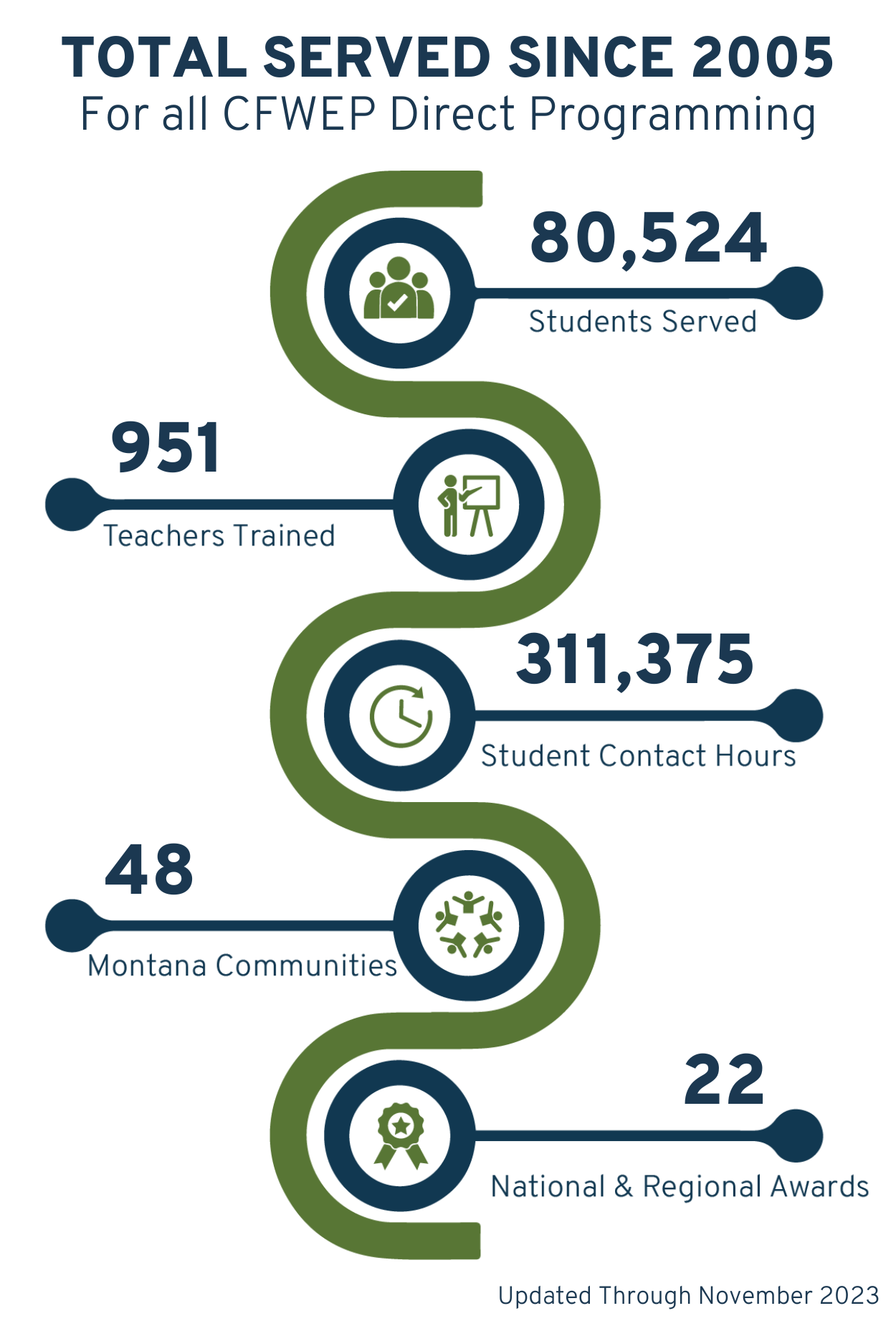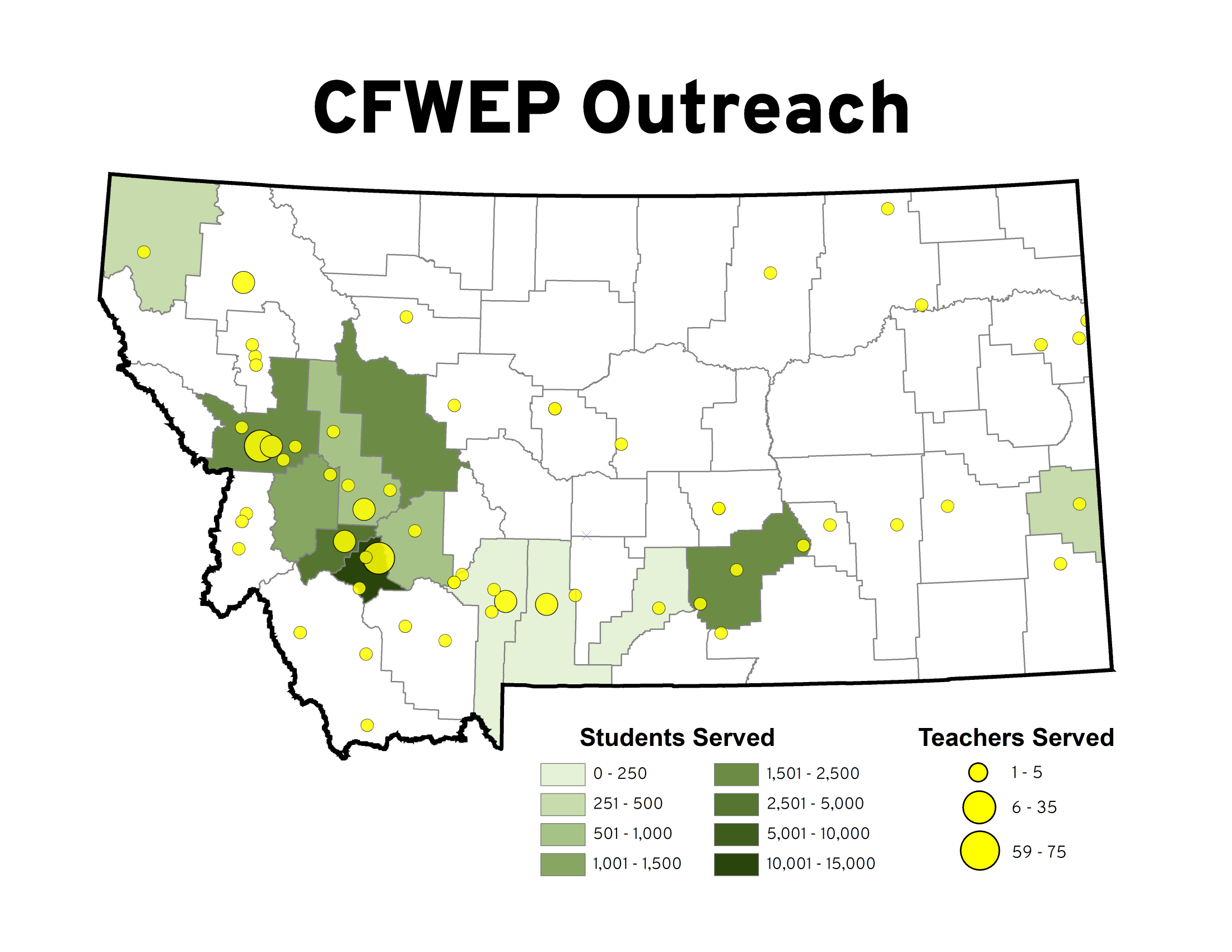About The Clark Fork Watershed Education Program
Mission
Expanding environmental literacy and stewardship through field-based science and research experiences.
Vision
We exist because the planet needs sustainable communities who value resilient ecosystems.
Values
Stewardship
We exist to ensure sustainable futures.
Trust
We communicate factual information that the public can trust.
Science
We encourage curiosity in ourselves and others through scientific inquiry.
Education
We promote scientific literacy through place-based, experiential learning.
Inclusion
We strive to provide accessible science for all.
Over
70,000
students served since 2005.
Who We Are
The Clark Fork Watershed Education Program (CFWEP) is a 501(c)(3) non-profit organization founded in 2005. We are headquartered in Butte, Montana as part of Montana Technological University, and we have a sub-contract with partners at the University of Montana’s Osprey Project, Biology Department, and Bird Ecology Lab.
Our programming has been presented to over 80,000 students in western Montana…an entire generation. Our professional scientists and educators have served more than 20 schools in the Clark Fork Watershed and over 35 schools outside our watershed. Our partners at the Montana Osprey Project are now reaching people worldwide through a live stream of the Hellgate Canyon Osprey Nest Camera.
What We Do
Place-based Science Programming
Our activities for students include:
- Five-day watershed science program
- Specialized field trips
- Watershed tours
- A summer fly fishing camp
- A creek clean-up day
- Stormwater art projects
- Songbird banding
- Osprey banding and monitoring
- Mentoring for authentic research projects
Student Experience & Pipeline
Our students become exceptionally engaged in studying the restoration happening outside their back door, mimicking biologists and restoration ecologists. Because of their involvement studying and solving local problems, some of them become excited to pursue STEM (Science, Technology, Engineering, and Math) degrees. Our watershed science programming and PHAGES programming serves as an early pipeline to careers in STEM for regional students.
Teacher Professional Development & Research Experiences
For teachers, we provide mentorship for long-term research projects, professional development in STEM, environmental education and place-based pedagogical techniques, and methods for mentoring authentic research projects for their students.
“CFWEP provides the fifth grade students at our school the incredible opportunity to connect with their local ecosystem and act as scientists in the field. Students gain knowledge of their community and of the ways that we interact with nature to help or hurt the health of our earth. The CFWEP activities are hands-on and tailored to connect to multiple academic subjects. It is especially powerful for students to see the different science professions they could pursue in the future!”
-Saundra Long, Missoula County Public Schools
“Working with CFWEP through MPRES has allowed me to become a better science teacher for students and teachers. I teach students and other teachers how to do science through the NGSS science and engineering practices. This really brings the content to life and connects how important science is for understanding the world we live in. MPRES has also allowed me to further develop my leadership skills which has affected my career and life in a positive way.”
-Christine O’Shea, Bozeman Public Schools
Our History
CFWEP is a non-advocational, non-profit organization working to foster environmental stewardship and scientific decision-making through place-based learning. Formed in 2005 with a small pilot project at Butte High School, our founders set forth with the intention of creating a legacy of environmental stewards, using the nation’s largest complex of Superfund sites as our curriculum and outdoor classroom.
Our mission statement was born from the knowledge that the long-term success of the restoration and remediation requires an informed citizenry. The central focus of our award-winning staff and programming is to educate, inspire and empower people to improve their communities. We utilize each community’s identity and sense of place as the springboard to engage our students.
Before our eyes, restoration and remediation has transformed streams that had been dead for over 100 years to thriving ecosystems. We believe that ensuring this legacy of informed citizens is now more critical than ever.


